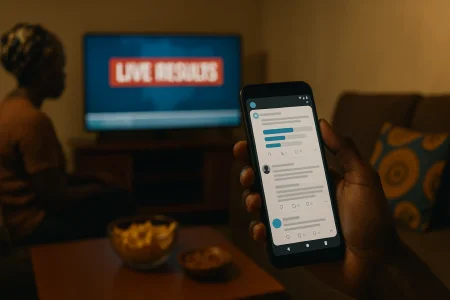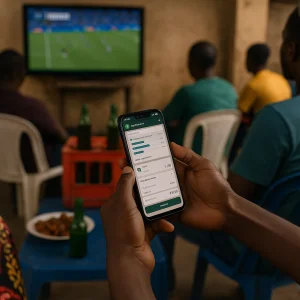
Nigerians love to predict outcomes, whether it’s election winners, Sunday fixtures, or even transfer stories. Imagine election result night in Lagos or an EPL afternoon in Surulere, where the viewing-centre buzz rolls straight into WhatsApp threads, X polls, and Instagram stories. What began in barbershops and radio call-ins now lives on our phones as public predictions and small-stakes bets. Politics and football trigger the same urge to be right, and cheap mobile internet made that habit mainstream.
From Street Debates to Screens: How Prediction Became a Daily Ritual
Before smartphones, predictions lived in familiar places: family tables after the evening news, campus corridors, radio call-ins, and crowded viewing centres on match days. The questions were the same: who will win, by how much, and why. Respect went to the person who knew form, history, and the small details others missed.Today, those arguments happen in public, on screen, and at speed. WhatsApp status polls run all weekend. Telegram groups post scorelines and likely scorers. Threads on X pull thousands of replies during debates or big fixtures. Short clips and reels turn hot takes into something easy to share, and now everyone can keep score of who called it right.
Reputation travels with you. In one 20-person WhatsApp group in Lekki, members drop their weekend picks every Friday night. Monday starts with screenshots and gentle teasing. The ones who predicted it early are remembered, and over time, that memory shapes who people listen to next.
Two Arenas, One Psychology: Politics and Football Run on Anticipation
At heart, it is the same feeling. Elections or a derby, we pick a side, predict the outcome, and wait. Colours, chants, and the “our own vs their own” talk feed the itch to be right and be seen.Prediction is also a status. Call it early on the radio, in a group chat, or on X, and people remember. Screenshots return later. If you nailed it, your voice gets louder next time. If you miss, the group teases, and you are tempted to fix your “record” with a bolder prediction.
There is a small rush that comes from predicting the result. You press “send,” your name is on it, and every new update feels intense. Even before the final whistle or official declaration, each rumour, chance, or late free kick feels like a test of your prediction. That thrill keeps people coming back.
How polls feel like odds, and form feels like momentum
Polls and betting odds do a similar job: they summarise where things stand right now. Both move when new facts land, like an injury, a debate moment, turnout signals, or a red card. Neither is a promise. A poll lead can fade with turnout. A heavy favourite can stumble after a bad substitution. The smart question in both worlds is simple: what changed, and is the crowd overreacting?Why do people double down after a wrong call
Most people dislike being wrong in public. After a wrong prediction, they defend it, post louder, or raise the stakes to win back respect. It is human. The fix is simple, not easy: pause, name what changed, update your view, and move on. In groups, the calm voice that switches when facts change earns real respect over time.Phones Changed Everything: Second-Screen Habits and Micro-Stakes
A match or result night is no longer a single-screen moment. People watch the TV while their phones feed live stats, clips, and fan takes. Every chance, corner, or card appears in real time, so opinions form faster and feel sharper.Because the phone is always close, predictions turn into quick actions. A thought in a group chat becomes a small stake a minute later. Most people are not chasing big payouts. They place tiny amounts for fun, to add spice to the game, or to compare slips with friends on Monday.
Short content drives a lot of this. A 20-second clip of a missed sitter can trigger “both teams to score” predictions in the chat. A screenshot of likely line-ups can push people toward a goals market. When an influencer or campus tipster posts a confident pick, the effect is instant, especially at halftime.
Affordable data keeps the cycle running. People stream highlights, check live numbers, and share slips without worrying about cost. The rhythm on match days and result nights is steady: watch, react, predict, stake a small amount, share, repeat.
When the Fever Peaks: A Nigerian Calendar of Prediction Spikes
Prediction fever rises in waves, tied to big political moments and the football schedule. You can almost set your clock by it.Politics
- Party primaries and convention season
- Debate nights and manifesto launches
- Mega rallies and last-week campaign pushes
- Collation and result nights
- Court rulings and tribunal judgments
- AFCON group openers and all Super Eagles match days
- AFCON and UCL knockout rounds
- NPFL title run-ins and relegation battles
- EPL derby weekends and the festive fixture pile-up
- Transfer deadline day and major injury-return announcements
From Talk to Tickets: The Economics Behind Predictions
There is a simple moment when talk turns into action. A friend drops a confident prediction in the group, someone else posts likely line-ups, and within minutes, a few people place small stakes. The step is easy because the phone is in hand and payments are simple: transfer, card, or wallet.Most activity sits at low amounts. People are buying excitement, not trying to pay rent. That matters because the price you see already includes a house edge. Single, sensible picks tend to lose slowly or win modestly. Big multis offer eye-catching payouts but fail more often because every extra leg adds a new way to be wrong. The thrill is real, but so is the maths.
Groups create mini-economies:
- Joint slips: three to ten friends each put in a small sum and vote on selections. Clear rules help: who decides, how to split, and when to cash out.
- Office or hostel leagues: a weekly table that awards points for correct calls. Small prizes keep it friendly and consistent.
- Survivor pools: pick one team each round; stay alive as long as your pick wins. These work well during AFCON or long league stretches.
Media and sponsors target the same hot windows because attention is at its peak. Live blogs, match trackers, debate nights, and highlight clips keep people on page, which makes ads cheaper per engaged minute. Brands favour slots tied to fixtures and result nights because the audience is active. That feedback loop is why prediction content is everywhere when it matters most.
If you map the flow, money follows attention. Attention follows moments with real stakes: knockouts, derbies, primaries, and result nights. Knowing that rhythm helps you decide when to engage, when to sit out the noise, and how much to spend for fun without drifting into trouble.
How People Actually Decide: The Inputs Behind a “Good Prediction”
A good prediction is rarely a guess. It is a quick read of the most important signals, plus the discipline to ignore noise. Here is what sharp fans and readers check before they speak or stake.Football inputs (what really moves outcomes)
- Recent form and style: Not just wins and losses, but how a team creates or prevents chances. A side scraping 1–0 wins from set pieces is different from one creating ten big chances a game.
- Injuries and suspensions: Missing a ball-progressing full-back can hurt more than missing a fringe striker. Depth matters.
- Fixture congestion and travel: Three matches in seven days, long away trips, or Thursday–Sunday turnarounds shave energy and focus.
- Head-to-head with context: Useful only when managers, systems, and key players resemble today. Old records without context mislead.
- Manager patterns: Who rotates after Europe? Who shuts games down early? Who chases when behind? These habits shape late goals and totals.
Politics inputs (signals, not certainties)
- Polling snapshots: Directional, not destiny. Check methodology, sample, geography, and date. Late shifts are common.
- Turnout patterns: Who shows up, where, and in what numbers often decides close races. Urban vs rural differences matter.
- Coalitions and ground game: Alliances, endorsements, and door-to-door operations can swing margins beyond headline polls.
- Debate and event moments: Strong performances can move undecided voters, but effects fade if not reinforced.
- Local issues: Fuel prices, salaries, insecurity, and service delivery can override national narratives.
Rumours, Fake News, and Bad Inputs: Keep Your Predictions Clean
On big nights, information can travel faster than the truth. A cropped screenshot, an old poll, or a training clip taken out of context can push whole groups into bad calls. The fix is not fancy. It is a few habits you repeat every time.Common traps to avoid
- Fake injury lists or old photos passed off as “today.” A player in gym wear does not mean he is out.
- Misquoted or recycled polls with no dates or methods.
- Out-of-context clips are used to claim a team is “finished.”
- Anonymous “insider” drops that no credible outlet repeats within the hour.
- Find the source. Club accounts for team news, league handles for fixtures, INEC or reputable media for political updates.
- Check the timestamp. If there is no date or time, treat it as unverified.
- Get one solid corroboration. A second credible report is the bare minimum.
- Ask what is actually new. If it is already public, prices and public mood may have moved.
One very confident person can tilt the whole chat. People copy the tone more than the facts. Light rules help: tag posts as rumour or confirmed, and make one person responsible for posting official line-ups or verified updates.
A real scenario
Two hours before a Lagos derby, a “hamstring injury” rumour about a key winger hits a campus group. Everyone shifts to under-goals and fades his team. Thirty minutes later, the official team sheet drops - he starts. The match finished 3–1. The loss was not bad luck; it was bad inputs. The smarter move was simple: wait for line-ups or keep stakes tiny until confirmation.
A 30-second checklist
- Who said it? 2) Where is the original post? 3) How old is it? 4) What is new here? 5) Has the price or public mood already moved?
Safety, Legality, and Picking Trusted Platforms (For Sports)
Enjoyment and safety go together. If you plan to act on a prediction, do it on a platform that plays by the rules and protects you.The basics, in plain English
- You must be 18 or older.
- Sports betting in Nigeria is regulated. Look for a visible licence notice on the site or app. Many operators carry federal oversight, and some also hold state permits where required.
- Political wagering is not a typical regulated product locally. Stick to sports.
- Licence and company details: A licence badge or number in the footer, plus a real company name and address.
- Clear terms: Read the rules on bonuses, minimum odds, expiry dates, cash-out, and voided bets. If it is vague, walk away.
- Responsible-play tools: Deposit limits, time-outs, self-exclusion, and reality checks you can switch on yourself.
- Local payments and withdrawals: Bank transfer or card deposits that work smoothly in Nigeria, with stated timelines.
- Verified support: Live chat or a Nigerian phone, or an email that actually responds. Test it with a simple question before you stake.
- KYC and security: Basic ID checks for withdrawals, an SSL padlock in the browser, and a clear privacy policy.
- Scroll to the footer for licence and company details.
- Skim the bonus rules and withdrawal policy.
- Test support with one question.
- Start with a tiny deposit and a tiny withdrawal to see if the pipeline is clean.
- Collect evidence: bet ID, screenshots, timestamps.
- Contact support and give them a fair window to respond.
- If they refuse to engage, escalate using the regulator contact listed on the site.
Keep It Fun: Responsible Participation for Real People
This is entertainment. Treat it like movie money or a night out, not a side hustle. Enjoy the build-up, share a few calls with friends, and move on when the whistle goes.Set simple guardrails
- Budget: Decide on a small monthly amount you can afford to lose. Break it into tiny unit stakes.
- Time: Pick windows you will engage in, such as Saturday afternoon. Avoid all-day scrolling.
- Stop rules: One bad day does not need “revenge stakes.” When you hit your limit, you are done.
- Turn on deposit limits and reality checks in the app.
- Try a cool-off or self-exclusion if the habit feels sticky.
- Keep funds in your bank, not the app wallet. Top up only what you plan to use.
- You are raising the stakes to get even.
- You are hiding slips or feeling tense about them.
- You are placing bets you did not plan, just to have action.
- When any of these show up, take a week off. Tell a friend you trust.
- Note stake, reason, and result in two lines.
- Review on Monday: what did you do well, and what was noise?
- Drop any market you keep losing in for the same reason, such as last-minute goal chases.
Prediction is part of how we watch and argue in Nigeria - ballot nights, derby days, and everything between. Phones made it louder and faster; the skill is slowing down. Stick to confirmed facts, ignore hype, keep stakes small, and treat it as entertainment. Celebrate the predictions you got right, learn from the ones you missed, and close the app when your limits say so. That balance is how the thrill stays fun.





